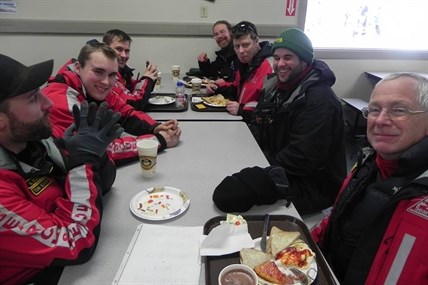
Kamloops Search and Rescue team members break for food following a rescue at Sun Peaks this past week.
Image Credit: Mike Ritcey
December 31, 2013 - 11:19 AM
900 MAN HOURS WENT INTO WEEKEND RESCUES
THOMPSON-OKANAGAN – Six skiers got lost out of bounds at Sun Peaks in five days, forcing Kamloops Search and Rescue members to put in more than 36 hours at the ski hill just last week.
Kamloops Search and Rescue Search Manager Alan Hobler estimates in total just his team members put in about 300 hours between the two Friday searches at Sun Peaks Resort, which included the rescue of two sisters and then a single woman in her 40s that began late Friday afternoon and ended 22 hours later. This came on the heels of a 14-hour rescue of three 14-year-old boys at the resort just a few days earlier.
When RCMP helicopter is required to assist it usually comes at a cost of about $2,000 per hour. Combine that with ski hill staff, equipment and the many other resources needed in a search and the costs can easily get well into the tens of thousands for a rescue.
Even then, Hobler says search and rescues do not charge for rescues and he does not want people to think about the potential costs if they are in need of help.
“Call as soon as you think there's a problem, the longer you wait the more (risk), and the greater the distance they can travel,” he says. “My target is to come in strong and heavy, even if I'm fairly confident they might walk out on their own or we'll find them early on. It's better than waiting another day.”
Search and Rescue organizations usually get operations money through fundraising, grants and the regional districts to help cover the cost of things such as equipment, command vehicles and snowmobiles while Emergency Management B.C. compensates for incidentals like meals and mileage for the members. The volunteers time, which 'can be considerable', is just that, volunteer time.
“The man hours are all volunteer,” Hobler says, “and the most expensive part of a search would be man hours.”
Outside of the actual rescue there is also gear clean up, repairs and debriefing, usually it adds up to another five hours of extra time after the search is completed, and then there is also the training time. Hobler says for every hour spent on a task there's usually another two hours of training time behind it.
On top of the standard required training to even become a member - a ground SAR certification course, first aid and drivers license - Kamloops team members are required to attend a full Saturday per month of training plus two nights of classroom training. There's also additional specialized training like swift water rescue, ice rescue, tracking and even team leader. Currently 30-35 people are active members.
The amount of time each member puts in depends on their availability but Hobler says for some it is a full time job on top of other jobs. Hobler himself is the operations manager for B.C. Parks while many others have come from paramedic or parks backgrounds.
“We have a broad cross section but everyone has that common thread of excitement, of getting that call at 1 a.m. to go out on a rescue,” he says. “Getting to someone within 24 hours is awesome and the majority of times that's what happens.
Other recent rescues in the Okanagan include a woman that got separated from her group in Hunter's Range, a snowmobiler in a remote Enderby area and two young boys lost in the woods at High Rim Trail near Winfield.
To contact a reporter for this story, email jstahn@infotelnews.ca, call (250)819-3723 or tweet @JennStahn.
News from © iNFOnews, 2013